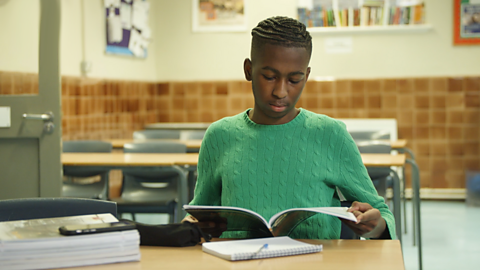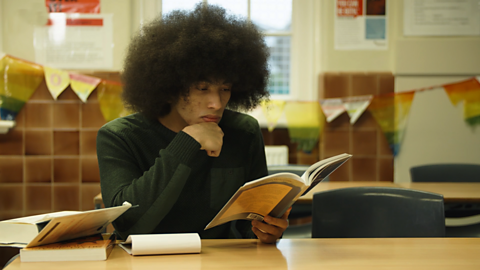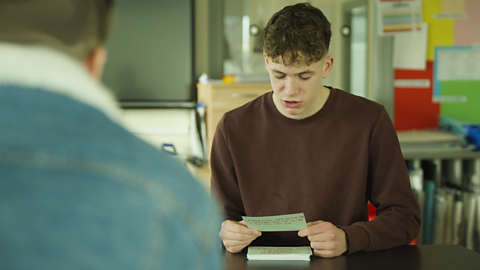This article was last updated on 5 May 2023.
There's an old saying 'tidy room, tidy mind' – the same can be said about revision and exam prep… the more organised you are, the easier it will be to keep on top of your tasks and keep your mind focused on getting the best grades you can achieve.
In this episode, we hear from our Mind Set coaches as they share what really helped them get organised, get started and make the most of their time.
Video: How to get organised
Lauren I am not a naturally organised person at all.
Milly I think being organised for revision and exams definitely brings calm to a situation, because as soon as you've got it all laid out in front of you, it's like I can be at peace now. I've got all my colours ready. You can really get into that revision, I think is a good way of enjoying it as well, to be honest.
RohanI'm a major procrastinator and I end up doing things that I shouldn't be doing. It was hard getting everything together because I'd left it so last minute. I've definitely learnt from my mistakes. I'm trying to be better at organising.
Lauren Organisation was like bottom on my list of priorities. I just went straight in with revising, had notes everywhere. When it came to looking through, that was when I realised I need to be organised.
Jacintha It's definitely important to consolidate your notes once you reach that final year. It Allows you to spot any gaps in your knowledge, which now is the time to address those.
Milly I think colour coding really helps me with my revision because it helps in my association during exams and when I'm recalling in revision. So if I see the colour green, for example, that reminds me of formula triangles, so I remember them formulas in the exam.
IainHaving a tidy room helps to keep a tidy mind. I find it's really important to keep an organised workspace because for me, it meant that I didn't have to bury through all my notes and look around the entire house just to find the right things.
Sekani It is really easy to get distracted if your stuff isn't organised properly because you can get loads different subjects mixed up together.
Jacintha Having a solid routine is really important to keep you organised during GCSEs. It's really good to know what you're going to do once the school day ends. You should know that maybe you're going to come home, have something to eat and then start revising. But don't forget to reward yourself a little treat once you've done all your hard work. Once you have that routine, it becomes second nature.
Rohan Having people like your parents and your friends and your family members holding you accountable for like getting your revision and everything done is like a major boost. I have two older sisters and they're like, got good grades and some of them have graduated. Having them be like, if you want to graduate, you've got to revise. I'm like, OK, like, I got it.
JacinthaEverything in the exam hall is essentially timed. So if you have a timer, when you're revising, when you're doing past papers, when you're go into that exam hall, you're going to feel much more comfortable with the timings.
Milly I think breaking subjects down into their topics really helps to identify what you don't know within a subject.
Iain I would recommend going to ask a teacher to look over just your revision timetable, and that way, you can just know that you've covered the whole course.
Rohan Some of my teachers offered after school sessions, which I went to, and I found them so useful.
Milly I think my teachers were really helpful when it came to exam board specifications because things are changing a lot and what we will be taking on our exams. So by consulting them helps me know what to revise and what not to.
Lauren I'm so much more organised now. GCSEs is definitely the biggest learning curve and organisation that I think I'll ever get.
IainI'm not a naturally organised person at all, and I have to constantly remind myself to keep organised so that I can do it, you definitely can.
Our coaches' top tips on getting organised

With mobile phones, social media and the many other temptations at your fingertips, Sekani says that it can be really easy to get distracted with your revision, especially if you aren’t properly organised with your subject notes. Jacintha agrees, saying, “It’s definitely important to consolidate your notes once you reach that final year because it allows you to spot any gaps in your knowledge… now is the time to address those.” Understanding more about how we learn is called metacognition, you can read more about it here.
Iain likes to keep his workspace tidy, “Having a tidy room helps to keep a tidy mind. I find it’s really important to have an organised workspace ‘cause, for me, it meant I didn’t need to burrow through all my notes and look around the entire house just to find the right things.” Meanwhile Lauren was the complete opposite! “I’m not a naturally organised person at all… organisation was at the bottom of my list of priorities… I had notes everywhere and when it came to looking through, that was when I realised I needed to be organised… GCSEs was definitely the biggest learning curve in organisation that I think I’ll ever get!”
Rohan thinks that having people like your parents and your friends and family holding you accountable for getting your revision and everything done is a major boost. Whilst Milly thinks being organised for revision and exams brings calm to a situation. "Breaking subjects down into the their topics," she says, "really helps you identify what you don't know within a subject."

Get revising: Tips on how to be efficient when revising
It's easy to get distracted when you're revising… you might be tempted to check your socials, catch up on a boxset or hang out with your friends – then before you know it, it's time for bed! But organising your day can really help.
Here's some tips on how to revise effectively, get organised, stay healthy and set some goals to help keep you on track with your revision.

What is The Mind Set?
The Mind Set is two things: a series of films to help support you through your GCSEs and Nationals and a group of amazing young coaches who appear in the films.
Our coaches have been through their GCSEs or National Qualifications already. They come from all different backgrounds and all corners of the UK and they’ve all faced different challenges in getting to grips with exam revision. What they’ve got in common is that they all have heaps of exam revision tips, advice, helpful hints, hacks and wonderful words of wisdom they want to share with you.
In the series, we also hear advice from mental health professionals like Josh Fletcher (AKA “Anxiety Josh”) on how to look after your wellbeing and stay resilient during revision and exams season and we have top revision hacks from our very own memory expert, Dr Vanessa Loaiza!
Explore the Bitesize Study Support pages for more information and revision support.
This article was last updated on 12 October 2023.
If you need support
You should always tell someone about the things you’re worried about. You can tell a friend, parent, guardian, teacher or another trusted adult. If you're struggling with your mental health, going to your GP can be a good place to start to find help. Your GP can let you know what support is available to you, suggest different types of treatment and offer regular check-ups to see how you’re doing.
If you’re in need of in-the-moment support you can contact Childline, where you can speak to a counsellor. Their lines are open 24 hours a day, 7 days a week.
There are more links to helpful organisations on BBC Action Line.
More like this
Revision: Top revision tips
Smart revision advice from those who've been there.

Study-life balance
Guidance on how to find the right balance between work and play to reduce stress.

How do I get started with revision?
How to get started with your revision.
